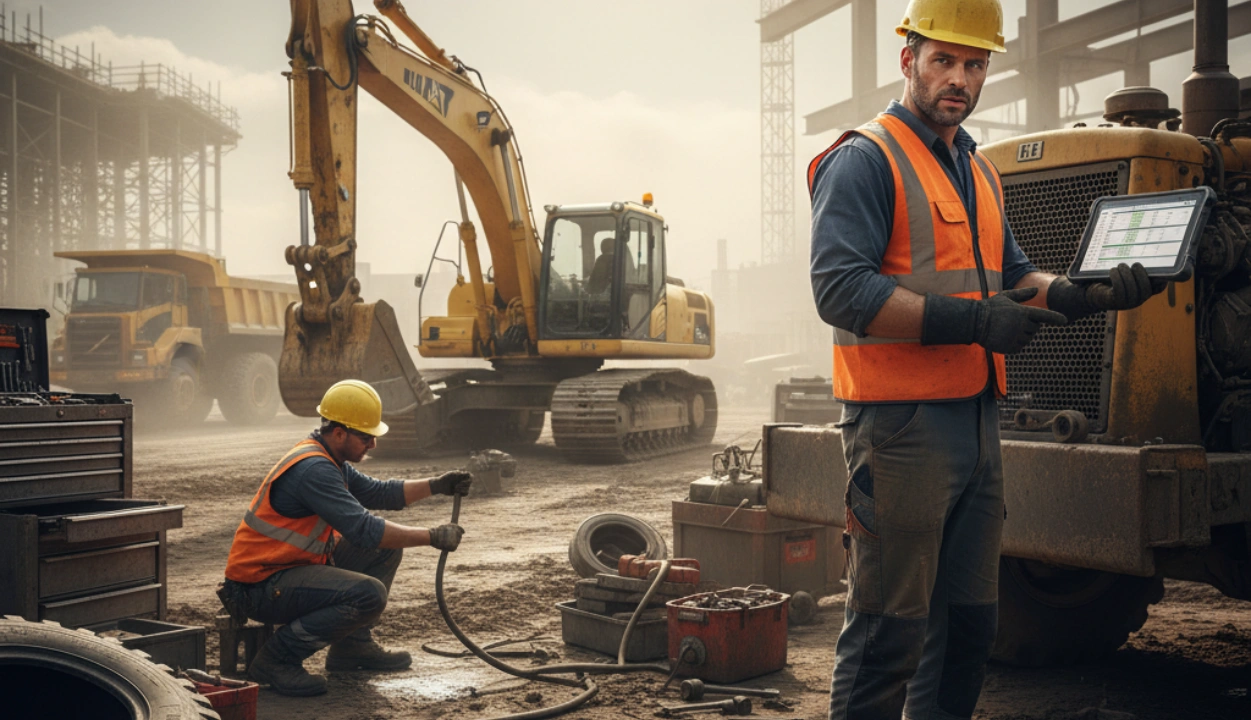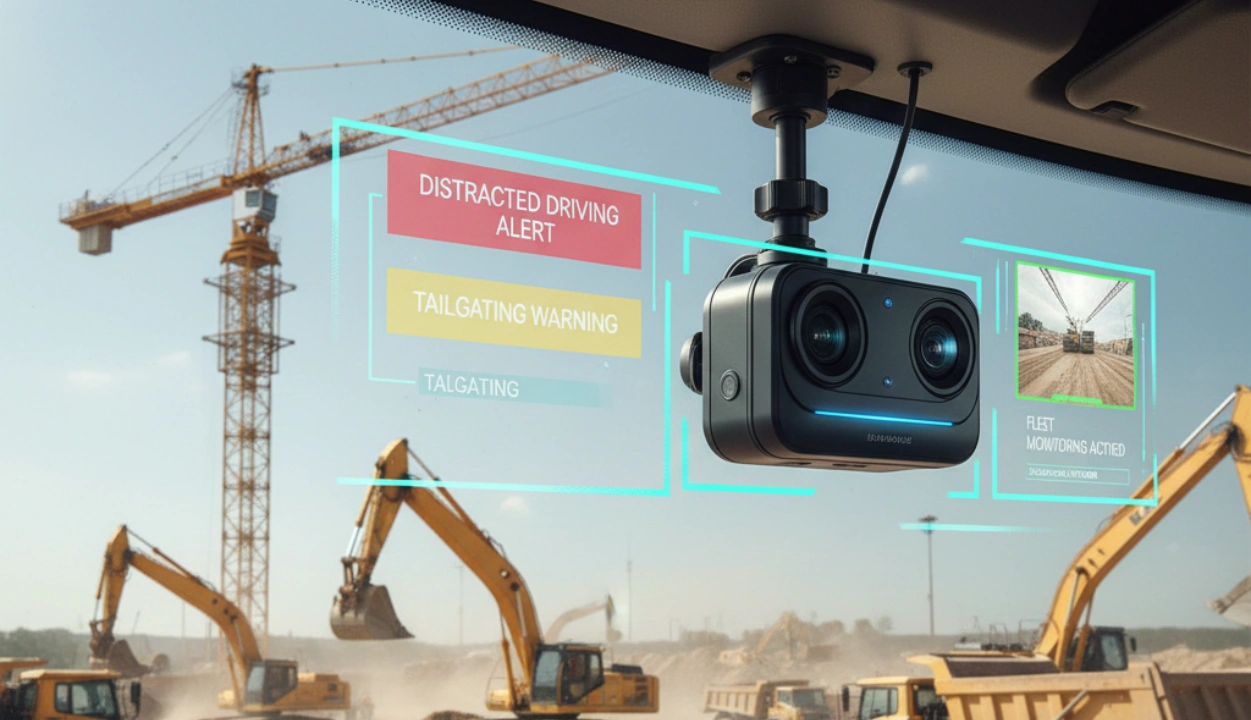10 Best Construction Fleet Management Software in 2025
Construction fleet management software is a purpose-built telematics platform that unifies GPS tracking, real-time machine data, and AI so every vehicle and piece of iron runs as one system. It tightens safety, boosts output, and cuts costs by turning raw signals into decisions.
Construction fleets aren’t bleeding time. They’re bleeding money. Unplanned outages can run ~$125,000 per hour across industrial operations. One bad day on a critical machine? Seven figures. And fuel? Idle is the quiet leak. A machine can burn ~1 gal per hour doing nothing. Multiply that across sites and you’ve got a budget with holes.
The fix isn’t more spreadsheets; it’s a clean signal. Live location, run and idle hours, operator behavior, and job-site geofences in one view. Inspections that become work orders. Faults that become fixed before failure. Data that moves via AEMP 2.0 and ISO 15143-3 so mixed-brand fleets finally speak one language. Hardware that’s off-road tough with theft deterrence and compliance baked in.
This guide is for the people who sign off on uptime and budgets. What to buy. What to measure. What actually reduces rentals, repairs, and risk.
Must-Have Features for Construction Fleet Management Software
- Vehicle & equipment tracking
See every truck, trailer, and machine on a live map with current status. Check run hours and idle time so you know what’s working and what’s parked. Mixed brands show together using AEMP 2.0 (ISO 15143-3), so you don’t juggle multiple portals.
- Driver monitoring & safety
Track speeding, harsh braking, and idling to spot risks early. You can add AI dashcams for clips when an event happens, which makes coaching simple and fair. Weekly scorecards show who’s improving and where to focus. - Maintenance & work orders
Use engine hours, temperatures, and fault codes to find issues before they become breakdowns. Turn a fault or failed inspection into a work order with parts and labor prefilled, then log the fix. A clear service history helps plan PMs and avoid surprise downtime. - Fuel & idling control
Pull in fuel card and tank data to see spend by asset and job. Get alerts for abnormal fills and high idle so you can act the same day. Trend views show which machines or sites waste the most fuel and what’s changing after you coach. - Compliance & inspections
Keep ELD/HOS, DVIR, and site inspection forms in one place. Drivers and operators can add photos, notes, and signatures, creating an audit-ready record without paper. Alerts flag missed logs or failed items so nothing slips. - Utilization by hours & jobs
See actual work time by asset run vs. idle hours so you can move underused equipment to the right site. Roll up usage and cost by job and cost code to justify rentals and plan the next shift. Clear reports make it easy to show results to finance and ops.
Top 10 Construction Fleet Management Software in 2025
Let’s pick the construction fleet software that pays back fast.
1. Clue
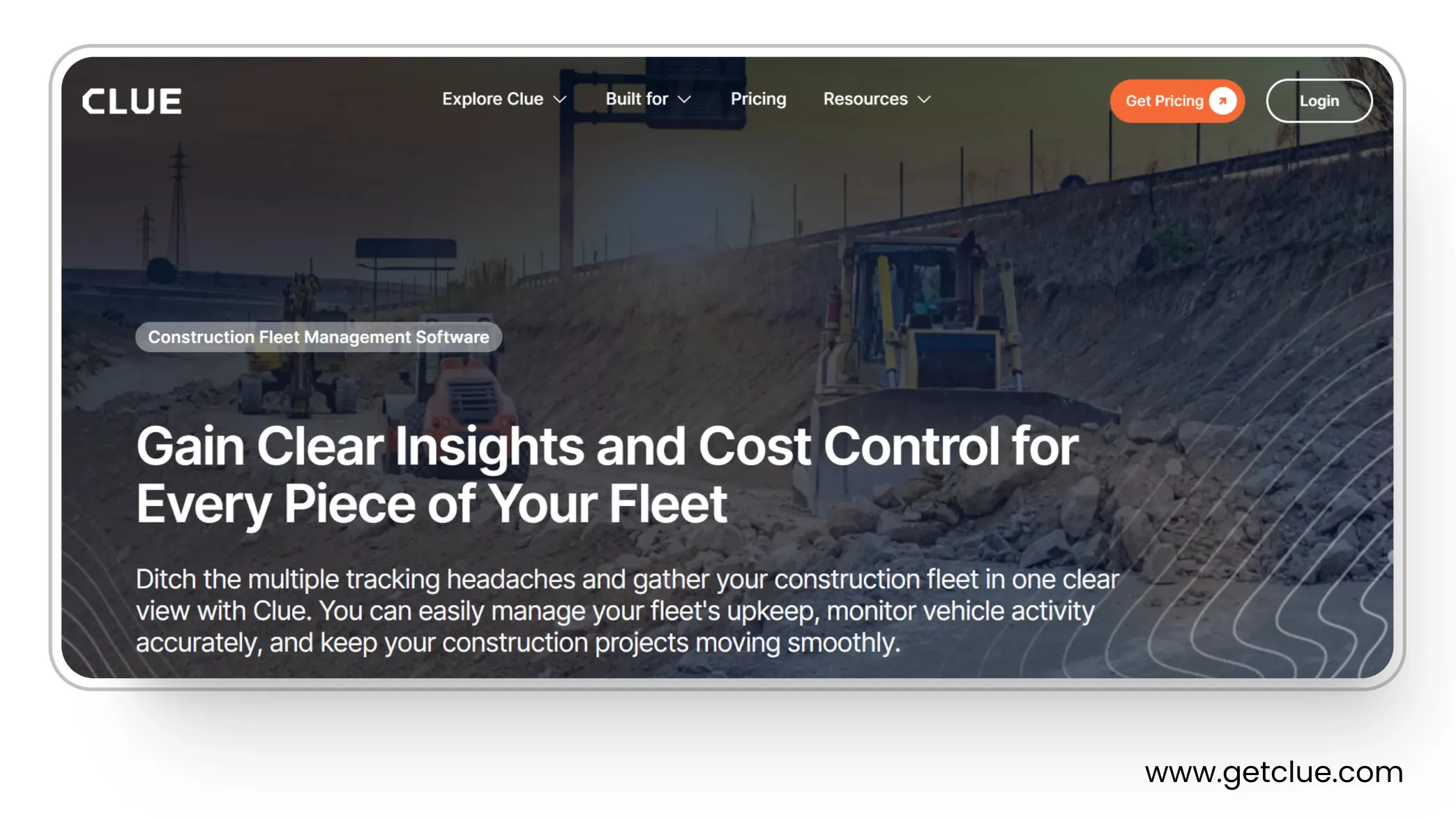
Clue is built for construction fleets and focuses on the things managers care about every day. You can see which fleet is on site, how many hours they ran, which ones are sitting idle, and what needs service now or next. Inspections are quick on mobile with photos and notes, faults trigger alerts, and every repair is logged so you keep a clean service history and cut surprise downtime.
It also shows usage and costs by job and cost code, so you know where time and money are going. Clue works seamlessly with data from different equipment brands, keeps PM schedules organized, and makes it easy for the field and the shop to stay in sync. This construction fleet management software ensures the right machine is ready when the crew is, and rentals and delays go down.
Why CLUE stands out
Vehicle & equipment tracking
CLUE shows every truck, trailer, and machine on a live map with clear status like running, idling, or stopped. You can see engine hours and idle hours without opening other tools. Data from different makers comes in through AEMP 2.0 and OEM feeds, so one screen covers the whole fleet.
Driver monitoring & safety
CLUE tracks speeding, harsh events, and long idle time for road vehicles. If you use AI dashcams, video clips appear with the event so coaching is simple and fair. Weekly scorecards highlight trends, making it easy to see who is improving and where risk remains.
Maintenance & work orders
CLUE turns engine hours, temperatures, inspection results, and fault codes into the next action. A failed check can open a work order with parts and labor already filled in. Preventive schedules stay organized, and complete service history helps you plan work and avoid surprise breakdowns.
Fuel & idling control
CLUE shows fuel spend by asset and by job. When partner or OEM telematics feeds include fuel level and burn, you see them next to utilization. When they do not, idle trends still point to easy savings. Alerts flag unusual fills and high idle, so you can fix issues the same day and track the change.
Compliance & inspections
Keep ELD and HOS, DVIR, and site inspections in one place. Operators capture photos, notes, and signatures in the mobile app, which creates an audit ready record without paper. Alerts call out missed logs and failed items so nothing is left open.
Utilization by hours
CLUE tracks actual work time for each asset, displaying running and idle hours by job and cost code. This helps you move underused equipment to the right site, reduce rentals, and plan the next shift. Clear, insightful reports and analytics make it easy to share results with operations and finance.
Pros
- Built specifically for construction equipment fleets.
- Clear utilization and idle views for fast reallocation.
- PM schedules tie directly to work orders and service history.
- Mobile inspections with photo proof and timestamps.
- Fault-code alerts from OEM telematics for early action.
- Open integrations and AEMP 2.0 support for mixed fleets.
- Documented customer outcomes on the site.
Limitations
- Initial setup requires mapping your construction fleet list and PM intervals inside Clue but it’s a one-time task and templates speed it up, so day-to-day use isn’t affected.
Clue Reviews
G2 4.7/5 (9 reviews)
Capterra 4.7/5 (11 reviews)
Pricing
Explore Clue's pricing options.
2. Samsara

Samsara is a mature fleet and safety platform with strong telematics, AI dashcams, GPS visibility, ELD and HOS, DVIR, and polished mobile apps. For construction fleets it delivers solid real time location and health data, video supported safety coaching, and compliance workflows that are easy for crews to follow.
Its scope serves many industries, which is why it ranks high overall. It is a great fit if your program emphasizes safety, driver oversight, and compliance for on road units. If you want deeper equipment utilization by hours tied to jobs and cost codes and inspection to work order flows for heavy iron, compare it with a construction focused system.
Pros
- Strong AI dashcams and safety coaching
- Reliable GPS and engine data visibility
- ELD and HOS and DVIR in one place
- Good mobile experience for field teams
- Large ecosystem and partner integrations
Limitations
- Broader focus than construction equipment programs
- Utilization and job and cost code reporting may need extra setup or another tool
- Pricing and terms often require sales contact and longer commitments
Samsara Reviews
G2 4.8/5 (1,160 reviews)
Capterra 4.4/5 (714 reviews)
Pricing
Contact Samsara for a personalized quote
3. Fleetio
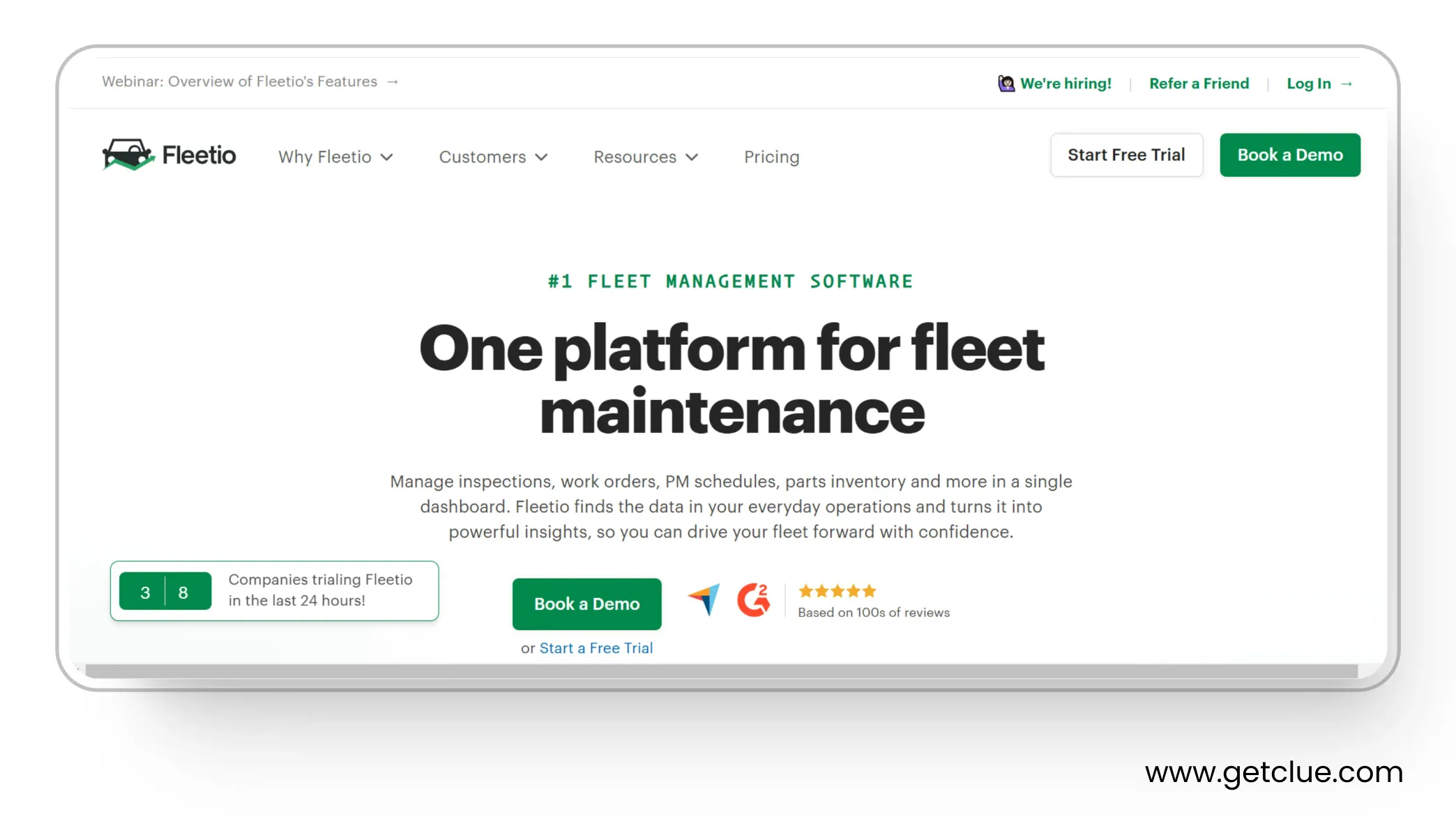
Fleetio is a maintenance-centered fleet platform that works well for construction teams that want clean work orders, PM schedules, service history, and inspection records without heavy setup. It excels at shop workflows and makes it easy to track parts, labor, and vendor service while pulling odometer and hour data from telematics partners.
It suits small to mid sized equipment programs that want a modern replacement for spreadsheets and a simple mobile app for inspections and work approvals. If you need deep utilization by hours tied to jobs and cost codes and heavy equipment specific health signals, you may pair Fleetio with a construction focused telematics layer.
Pros
- Clear work orders and PM scheduling
- Easy mobile inspections with photos and comments
- Parts and vendor management built in
- Good reporting for service history and costs
- Integrations with common telematics and fuel cards
Cons
- Relies on partner telematics for live engine and location data
- Utilization by jobs and cost codes is limited without extra tooling
- Fewer heavy equipment specific workflows than construction first systems
Fleetio Reviews
G2 4.5/5 (155 reviews)
Capterra 4.8/5 (204 reviews)
Pricing
Check out Fleetio for a personalized quote
4. Geotab
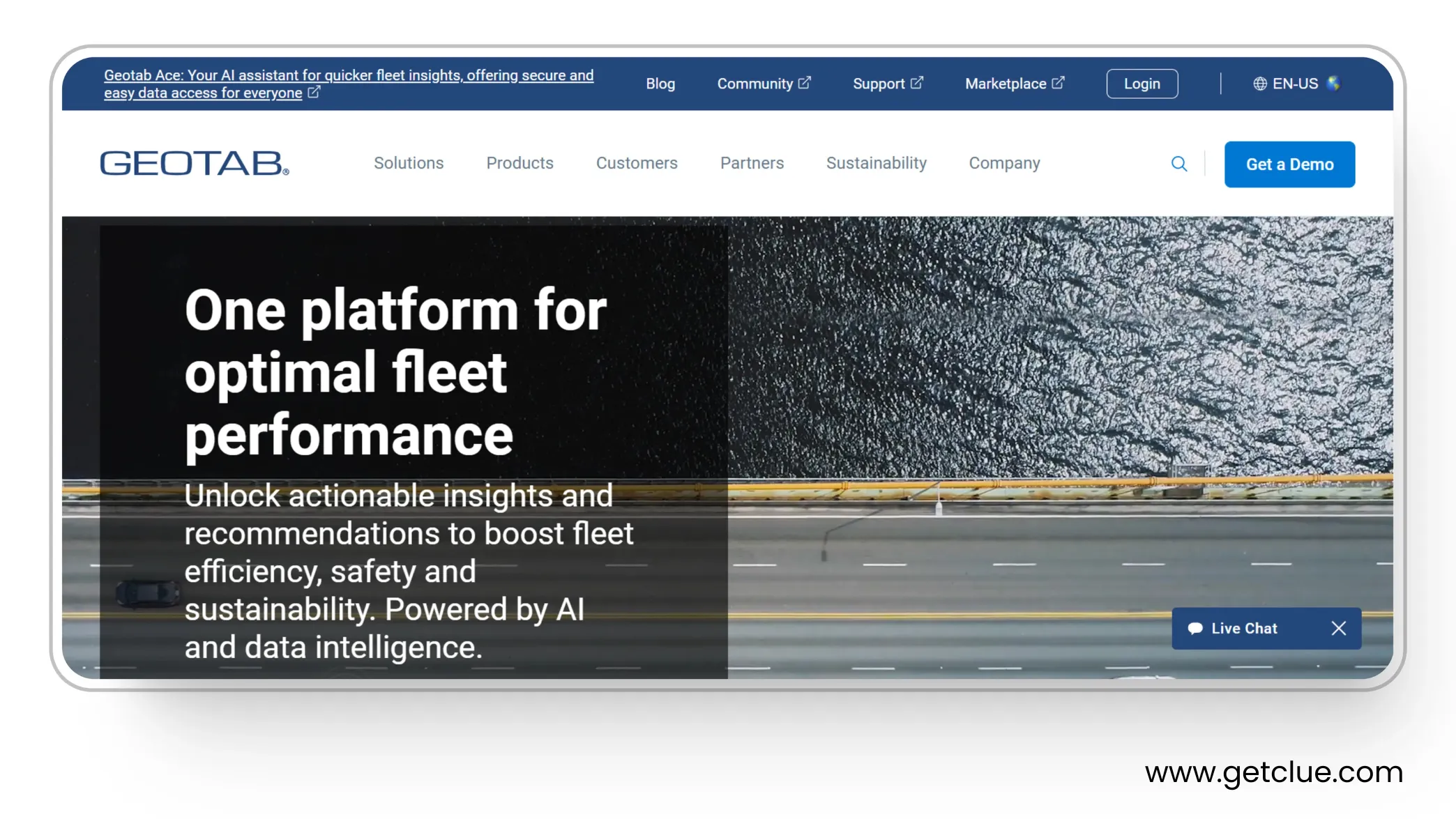
Geotab is a data-strong telematics platform known for deep engine diagnostics, reliable device hardware, and a large add-on marketplace. For construction fleets it’s a solid backbone for location, engine hours, fault codes, and idling, and it plays well with mixed-brand equipment via partner and OEM data connections.
It fits teams that want high-quality telemetry and flexibility to build their own stack. If you’re looking for construction-specific workflows inspection forms that flow into work orders, utilization by job and cost code, shop scheduling you’ll usually pair Geotab data with a construction-first system.
Pros
- Robust engine data and fault-code visibility
- Stable hardware and wide device support
- Flexible rules and alerts for idling and safety events
- Large marketplace and partner ecosystem
- Scales well across big, mixed fleets
Cons
- Not a construction-first workflow tool out of the box
- Inspections, PMs, and work orders often require third-party apps
- Pricing and support vary by reseller and package
Geotab Reviews
G2 4.4/5 (75 reviews)
Capterra 4.4/5 (95 reviews)
Pricing
Contact Geotab for a personalized quote
5. Motive
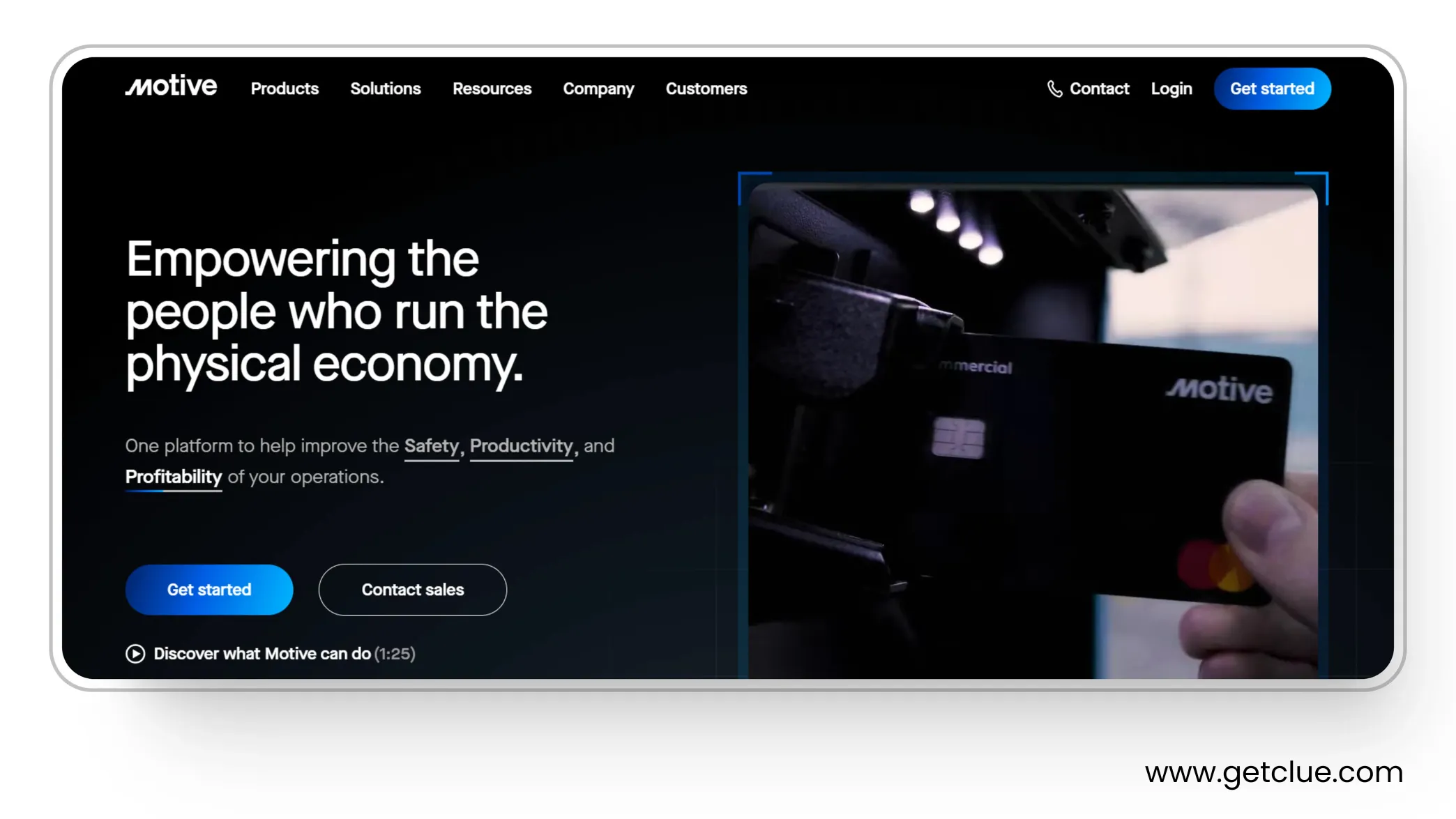
Motive is a well known fleet platform focused on safety, compliance, and day to day visibility. It combines AI dashcams, live GPS, ELD and HOS, DVIR, and maintenance tools so managers can see issues early, coach drivers, schedule service, and keep clean records.
For construction fleets this brings strong video safety and compliance coverage with helpful engine and fault alerts where supported. Maintenance pages and the help center show inspections, service schedules, and fault workflows that reduce surprise downtime. Pricing is quote based and often discussed with sales.
Pros
- AI dashcams with real time alerts and coaching.
- Reliable GPS and status visibility for assets and vehicles.
- ELD and HOS and DVIR in one platform.
- Maintenance module for inspections and service scheduling.
- Marketplace integrations to extend workflows.
Cons
- Built for many industries, not only construction equipment programs.
- Deeper equipment utilization by job and cost code may need another system.
- Public list pricing is limited and terms are usually handled by sales.
Motive Reviews
G2 4.5/5 (2,040 reviews)
Capterra 4.5/5 (1681 reviews)
Pricing
Contact Motive for a personalized quote
6. Lynx
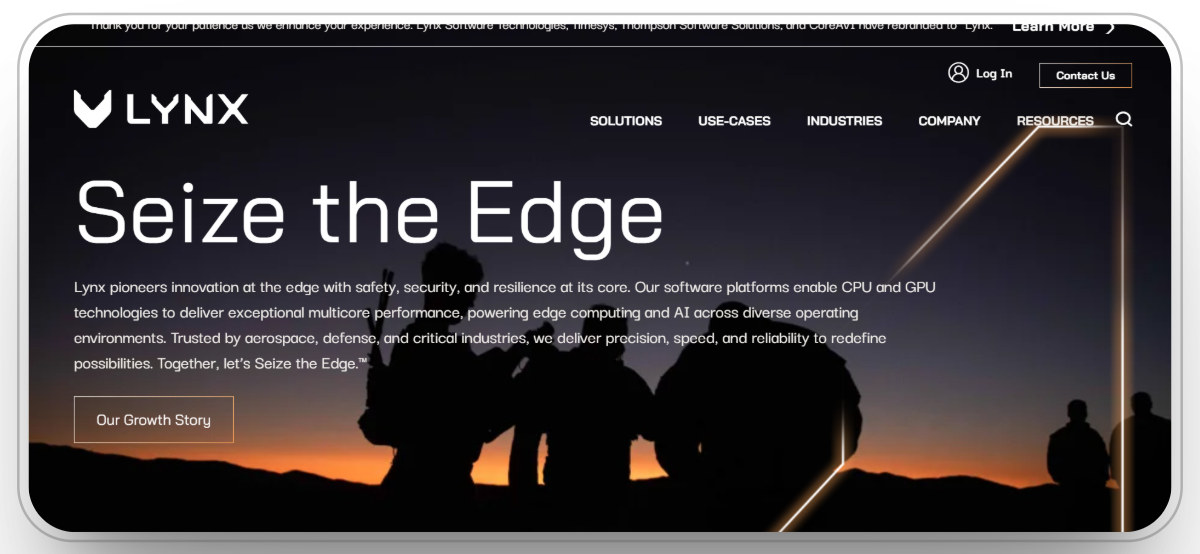
Lynx is a vehicle-fleet telematics platform built around refrigerated transport. It combines GPS tracking with TRU health, temperature monitoring, alerts, and digital recordkeeping to help fleets protect loads and meet cold-chain requirements. Recent updates added an API toolkit for TMS integrations and support for electric TRUs.
It’s a strong fit if you run reefers and want compliance-ready temperature histories plus standard fleet visibility in one place. It also supports dry vans and mixed manufacturers, so you’re not locked to a single OEM view. Activation and plans are handled via Carrier Transicold dealers.
Pros
- GPS + TRU health with temperature, fuel/battery, and mode change alerts.
- Digital temperature records that support FSMA/shippers’ audit needs.
- API toolkit for sharing data with most major TMS; broad mixed-fleet support.
- Cellular + satellite connectivity and over-the-air updates to TRUs.
Limitations
- Reefer-centric: best for cold-chain fleets, not heavy-equipment workflows.
- Hardware/subscription setup typically goes through Carrier dealers.
Lynx Reviews
G2 4.5/5 (1 reviews)
Capterra 4.3/5 (4 reviews)
Pricing
Quote-based subscription with tiered service plans; activation/commissioning via authorized Carrier Transicold dealers.
7. Fleet Complete
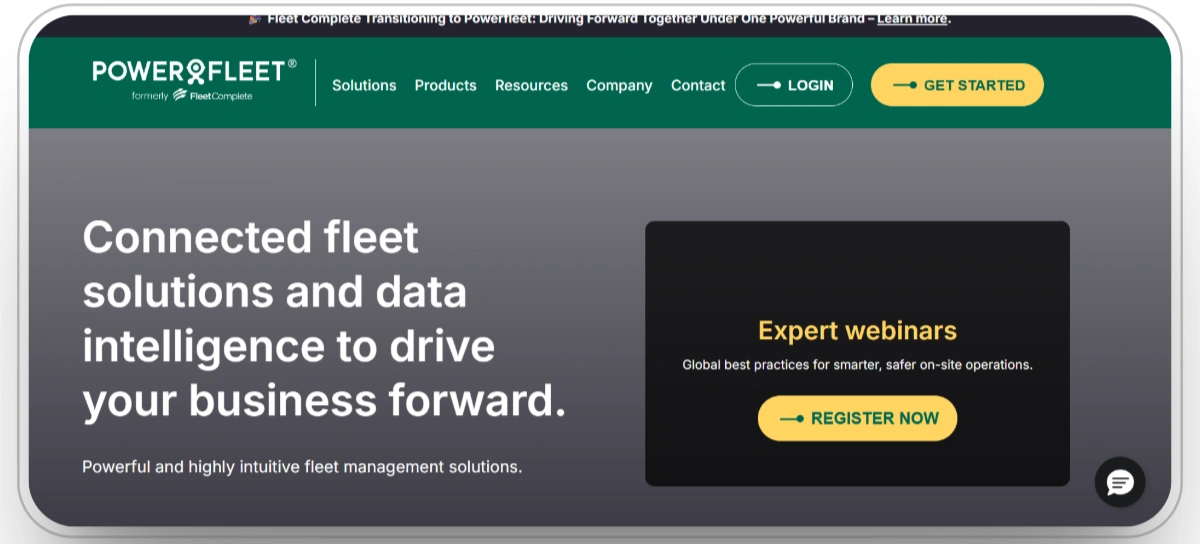
Fleet Complete is a vehicle-fleet telematics platform that brings GPS tracking, driver safety (AI dashcams), ELD/HOS, DVIR, and maintenance/inspection tools into one stack. The suite includes BigRoad for ELD compliance, Vision AI dash cameras, and mobile inspection apps, with packaging handled through quote-based plans.
It’s a good fit for fleets that want road-vehicle visibility, driver coaching, and compliance workflows without heavy customization. If you need temperature-controlled cargo monitoring or asset tracking, the ecosystem also pairs with carrier partners and add-ons. Contracts and legal terms are published, and service is often delivered via carrier/reseller channels.
Pros
- ELD/HOS with BigRoad plus DVIR in the same environment.
- AI dashcams (Vision) for real-time event detection and coaching.
- Mobile inspections with photos, signatures, and defect tracking.
- Quote-based packages with a public plan comparison page.
Limitations
- Branding is in transition, which can make documentation and support links vary by region.
- Advanced workflows may require additional tools or integrations.
Fleet Complete Reviews
G2 2.8/5 (3 reviews)
8. Verizon Connect
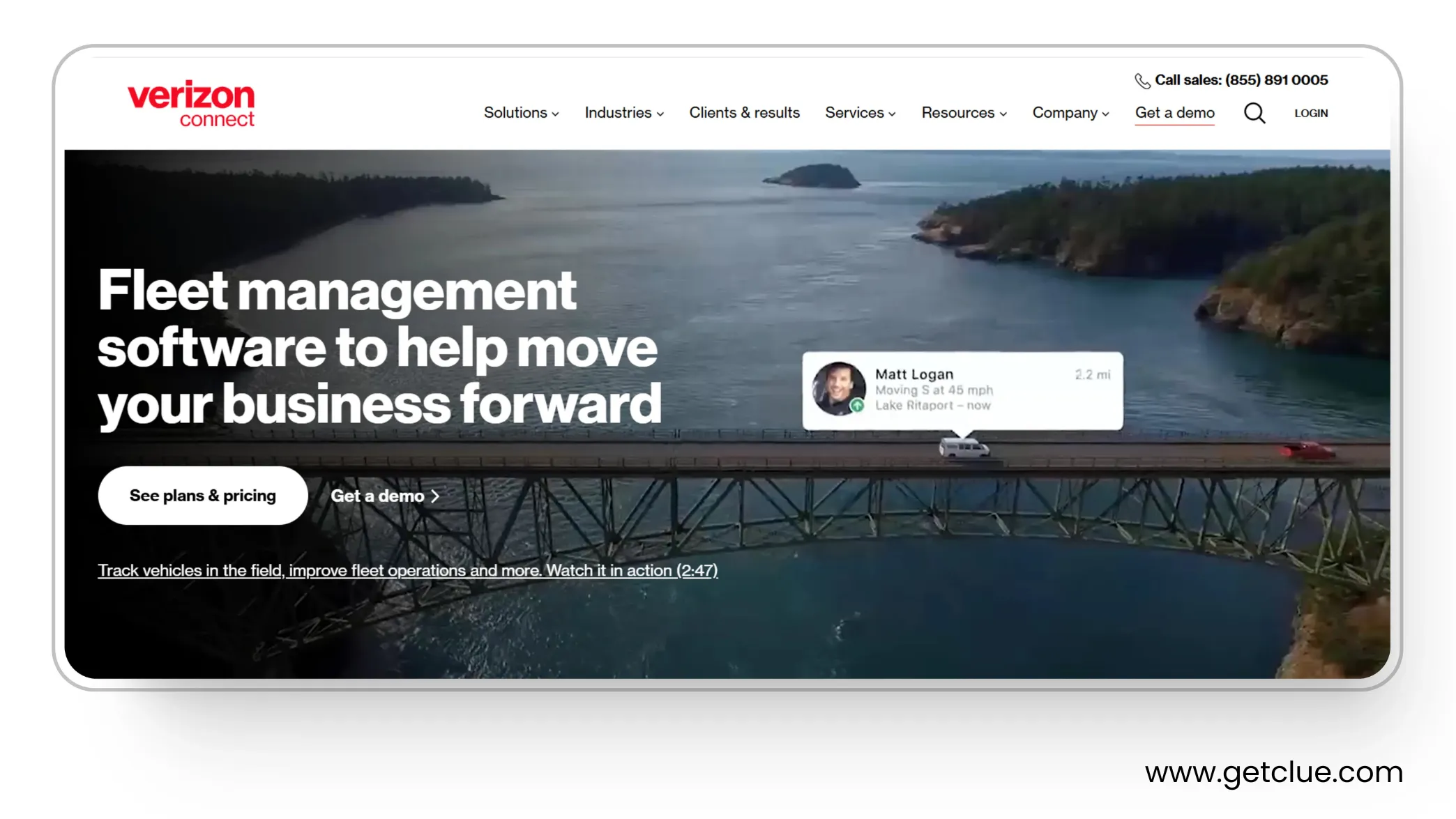
Verizon Connect Reveal is a broad fleet platform that covers GPS visibility, diagnostics, maintenance scheduling, DVIR, and AI dashcams. The DVIR workflow is integrated and supports photos and signatures, and the dashcam portfolio focuses on real time event detection and coaching.
Construction fleets get strong compliance and safety coverage with a large vendor behind the product. EV monitoring and a wide feature set help mixed use cases, though packages and terms are typically handled with sales.
Pros
- Integrated DVIR with mobile capture and desktop reporting.
- AI dashcams with event alerts and coaching.
- GPS and diagnostics that scale to large fleets.
- EV fleet features are available in Reveal.
- Backed by a large provider with broad support.
Cons
- Built for many industries, not only construction programs.
- Breadth can add a learning curve for new users.
- Pricing and terms are not listed and often longer.
Verizon Connect Reviews
G2 3.8/5 (949 reviews)
Capterra 3.2/5 (928 reviews)
9. Chevin FleetWave
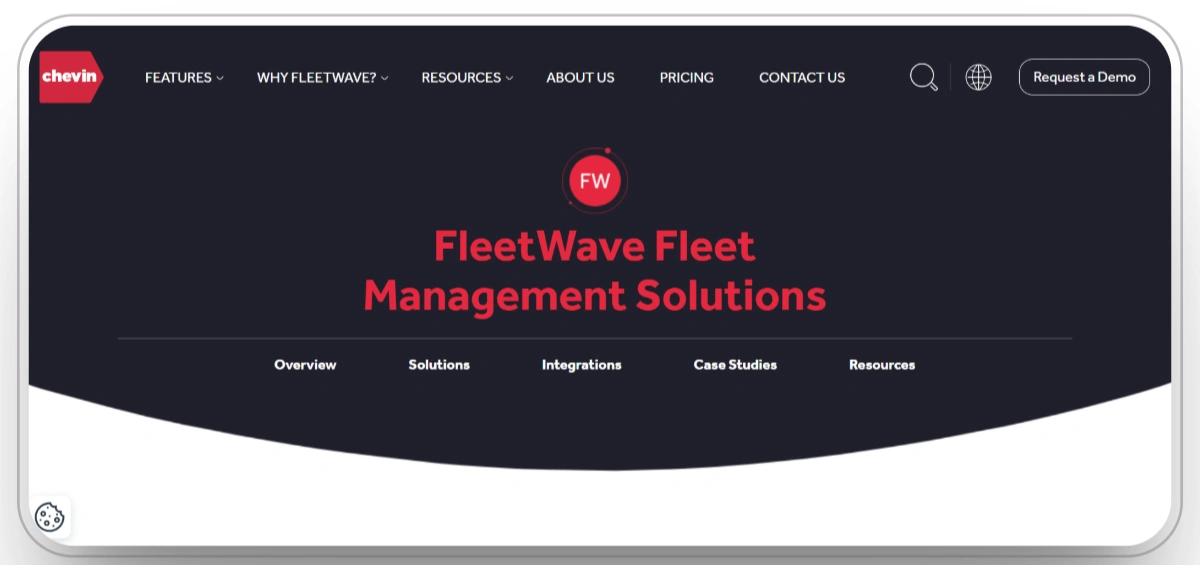
Chevin FleetWave is an enterprise fleet information system with configurable workflows for asset, maintenance, fuel, and compliance management. It offers a construction page and product editions that scale from lite to advanced, with web access for teams and integrations to telematics, fuel cards, and ERP.
For construction fleets, FleetWave centralizes equipment and vehicle records, schedules service, tracks costs, and produces audit-ready reports. It is a good fit if you want a flexible FMIS that can connect to your existing stack and standardize data across large or mixed programs.
Pros
- Construction solution page and industry alignment.
- Service, fuel, compliance, and cost reporting in one system.
- Editions (lite, core, advanced) to match program size.
- Integrations for telematics, fuel cards, and ERP.
- Web access for distributed teams.
Cons
- Broad FMIS scope means more configuration effort up front.
- Heavy equipment signals rely on connected telematics feeds.
- Pricing is per vehicle per month but final quotes are handled with sales.
Chevin Fleetwave Reviews
G2 4.5/5 (3 reviews)
Capterra 4.3/5 (9 reviews)
10. Azuga Fleet
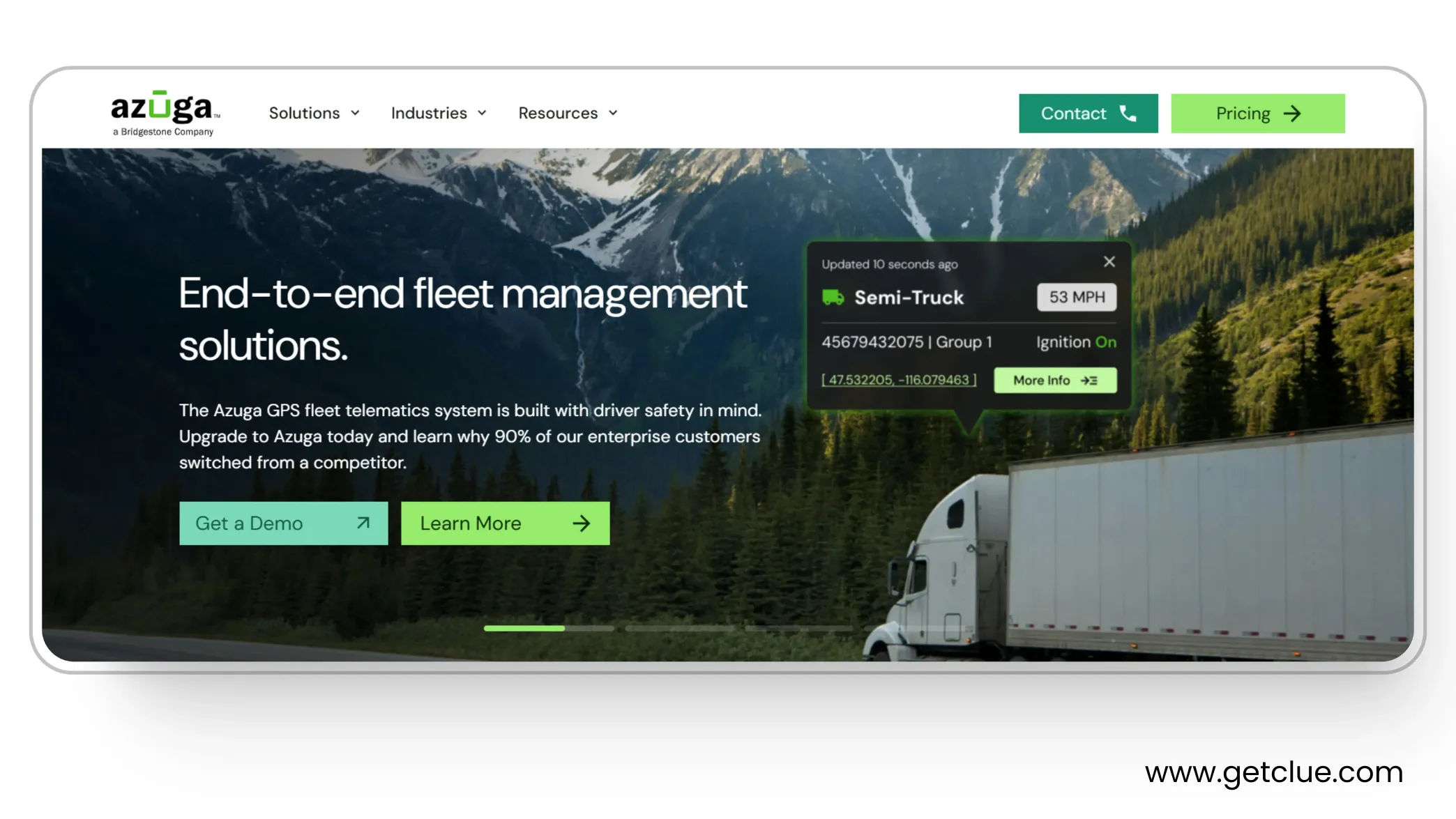
Azuga provides GPS tracking, driver scoring, maintenance tools, DVIR, and widely used AI dashcams, with a dedicated page for construction and heavy equipment. Public pages show tiered plans and a pricing flow that generates custom quotes, plus regular product updates in the knowledge base.
For construction fleets, Azuga delivers clear safety features, location awareness, inspections, and helpful fault and maintenance workflows. It is a strong choice if you want driver coaching and camera evidence with simple fleet tools, and you are comfortable pulling deeper equipment analytics from connected OEM feeds where available.
Pros
- Construction and heavy equipment industry page.
- AI dashcams with real time events and coaching.
- DVIR, maintenance scheduling, and alerts are documented.
- Pricing flow and plan tiers are visible on site.
- Frequent product release notes for web and mobile.
Cons
- Focus spans many industries, not only construction equipment.
- Deep utilization by hours and cost code mapping may need another system.
- Exact monthly pricing is often finalized through sales despite tier pages.
Azuga Fleet Reviews
G2 4.5/5 (3 reviews)
Capterra 4.3/5 (9 reviews)
Quick buy-checklist
- Pick Clue when you want that equipment-first 360° system hours to jobs and cost codes, faults and inspections turning into work orders, AEMP/OEM data in one view, offline mobile for sites, and clear exec dashboards that cut downtime and rentals.
- Select Samsara when safety and compliance drive the program AI dashcams, ELD/HOS, and DVIR with solid telemetry accepting its cross-industry scope while gaining mature hardware and coaching that reduce incident risk.
- Choose Geotab when you want a telemetry backbone rich engine data, rules, and a big marketplace to feed other construction tools, trading built-in equipment workflows for maximum integration flexibility.
- Go with Fleetio when the maintenance shop is your center: clean PM templates, parts and vendor control, and service history adding telematics partners for meters and faults as you scale.
- Opt for Motive when AI video safety and driver accountability are the top risks, and you still want practical GPS, inspections, and maintenance without heavy customization.
- Consider Tenna or HCSS when contractor-style asset tracking, job costing, and deep shop flows are the priority, and you’re ready to align asset lists, meters, and site names to get full value.
Conclusion:
Each fleet management system brings its own strengths. Samsara excels in real-time tracking, Fleetio in maintenance, and Azuga in driver safety. Yet, most focus on individual features rather than offering a complete solution.
Clue stands apart by bringing everything together in one powerful, unified platform. It delivers real-time insights, predictive maintenance, and proactive risk management all designed to adapt and grow with your business.
If you’re ready to streamline operations and elevate efficiency, Clue is the all in one fleet management solution built to drive your success.
FAQs:
Q. What is the difference between fleet management and logistics?
Fleet management focuses on operating, maintaining, and optimizing a company’s vehicles reducing costs, ensuring safety, and improving uptime. Logistics is broader: it handles the flow of goods, including inventory, warehousing, and transport between locations.
Q. Why do we need a fleet information management system?
It centralizes all vehicle, driver, and operational data in one place giving you clarity, real-time insight, and faster, informed decision-making across your fleet.
Q. How much does a fleet management system cost?
Prices typically fall between $8,000 and $15,000 for a full-featured setup, depending on features, number of vehicles, and integration complexity.
Q. What size fleet requires fleet management software?
Any fleet with 5 or more vehicles can benefit small fleets, too, can see improvement in efficiency, reduced fuel use, and better maintenance tracking.
Q. What core features should fleet software include?
Key must-have features are GPS tracking, maintenance scheduling, driver behavior monitoring, route optimization, and analytics dashboards
Q. Can fleet software help with regulatory compliance?
Yes. Most robust systems support ELD (electronic logging), HOS (hours-of-service) rules, DVIR reporting, and audit-ready records.
Q. Will fleet software reduce fuel and maintenance costs?
Definitely. By optimizing routes, reducing idle times, predicting maintenance needs, and improving driver behavior, the software can achieve significant cost savings.
Q. Is fleet management software scalable for growth?
The best systems are built to scale from a small number of vehicles to hundreds or thousands without losing performance or insight.
Transform Your Equipment Management








